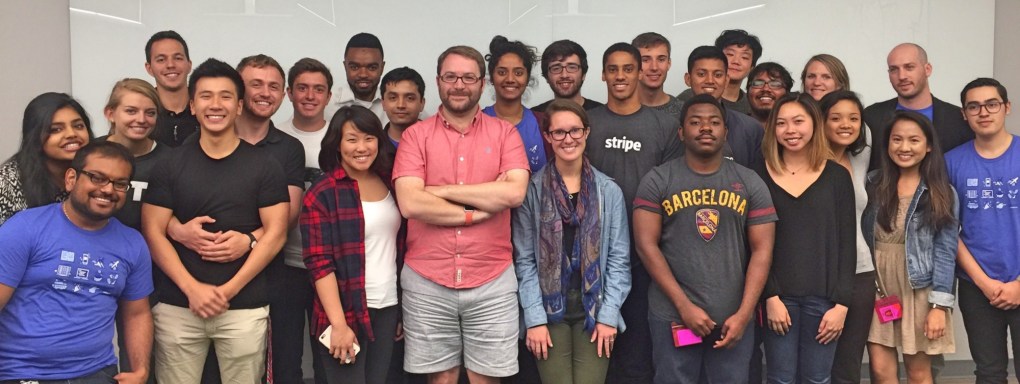It’s a scene familiar to many tech companies: summer rolls around, and the office is filled with interns who bring fresh ideas and energy to the workplace. In their first few days, they’ll typically attend some training sessions. Then, once they get settled in, they work on projects where they can contribute meaningful work in a short period of time.
But there’s much more to an excellent internship program than training sessions and project assignments. Strong internship programs need to proactively help interns level up and contribute successfully to the company. That’s why at Slack, we pair every intern with a mentor.
This summer, I had the privilege of mentoring Melissa Khuat, a software engineering intern from University of Washington. Melissa was able to contribute to our code base and participate fully in our workplace. She even gave a few presentations to teach the Platform team about SOLR and our real-time monitoring tool.
Mentorship is an active process where you offer your time, support, and insight. What we, as mentors, get in return is an unparalleled growth opportunity.
When good mentorship happens, both the mentor and mentee get more back than what they put in.
Melissa did all the hard work of setting ambitious goals, committing to them, and making the most out of her experience. As a mentor, my focus was on helping her find the technical and organizational tools to succeed.
When you become a mentor, there are specific things you can do to contribute meaningfully to your mentee’s work experience, self-confidence, and ability to succeed in the workforce.
Let me share some tips and tricks for mentoring interns, based on the lessons that I learned this summer.


Get to know your mentee
You will meet a unique, talented, and inspiring person. Get to know them — ask them about their interests, and find out what makes them tick. Ask them what they want out of their internship experience, and what they’re looking for in a mentor.
After Melissa’s internship, she told me how much impact that simple question had on her during our first meeting. Thinking about the answer empowered her to be be proactive about making the most of her internship experience.
College-level interns often don’t have much job experience. Because of that, they might not know exactly what they want or how to respond right away. If your mentee hasn’t thought about these questions before, that’s okay! Asking them prompts them to think about it. Get their preliminary thoughts and let them know that you are available to discuss these topics at any time.
Sometimes your mentee won’t give you direct feedback on what they’re looking for. When you meet, ask how you can help and whether they have questions about their work, the organization, or anything at all.
Some questions will need to be redirected to their manager, the internship coordinator, or someone from another team. In that case, help your mentee determine who the right person is, and empower them to ask that person directly.
Remember that as a mentor, you also have a huge opportunity to learn and grow. Pay attention to all the things that you are learning about yourself, working with other people, and your company. It is illuminating and refreshing to see your own company through a fresh perspective. Mentorship is an opportunity to gain new insights into the corporate culture that you have already become deeply familiar with.
Build trust
Melissa and I didn’t have a recurring weekly meeting, but we met regularly over boba, tea, and coffee to talk about work and life.
Whether you have a standing meeting or impromptu ones, make sure you meet regularly with your mentee. This builds trust. Trust is further built by mutual understanding, taking the time to listen and connect, and being consistent.
Trust is the foundation to effective communication. It paves the way for you to give timely and appropriate feedback to help your mentee navigate their internship experience. Without it, your advice can become meaningless or misunderstood.


Be proactive
In addition to regularly scheduled events, swing by their desk and reach out to see how they’re doing. If your mentee is interested in a particular topic, let them know about relevant meetings, events, or reading materials.
Bring your network to them and introduce them to people, both inside and outside the company.
This goes a long way to help your mentee feel welcomed in the industry. Feeling included and safe leads to confidence, better communication, and a higher quality of work.
Melissa mentioned to me that she had enjoyed classes in Asian American studies at university, so I invited her to an Asian American authors’ book club called Tea Leaves. Even though she couldn’t make it to the discussion, she told me several times how much she appreciated the invitation.
Provide feedback
Mentoring is different from managing. As a mentor, I don’t evaluate performance or determine whether we make a full-time job offer. I don’t determine which projects my mentee works on. I also don’t provide the same type of feedback as a manager — but I’m still responsible for providing feedback.
Feedback can come in the form of praise, advice, and suggestions.
It can be a way to draw their attention to a growth area. Encourage your mentee to think constructively about their performance, communicate effectively with their manager, and proactively identify interests.
In order to provide useful feedback, you will need to understand what your mentee needs. Some mentees need technical guidance. Others need information about how to navigate an organization or get more visibility for their work.
Listen
Learning what your mentee needs requires active listening. You’ll need to hear what your mentee has explicitly identified as a growth area, but also recognize other growth areas they haven’t yet identified.
Remember that you’re part of their support team — along with managers and other coworkers.
Do some work behind the scenes to ensure that important information is communicated clearly to your mentee. Sometimes you’ll need to work with their manager if your mentee is confused about feedback they received.
During one meeting with Melissa, she raised a concern about conflicting messages between the expectations being set by the internship program and her own goals. I encouraged her to speak with her manager directly, which she did. Because she was still unsure after that, I asked him to follow up with her to provide more specific details.
Working closely with their manager is especially important for interns, because they might have questions that you don’t remember having — like what to talk about in a 1:1 with their manager, how to ask for feedback on their performance, what it’s like to be promoted, how the organization is structured. Mentorship can be an unparalleled opportunity to learn more about your company. The exercise of putting yourself in someone else’s shoes will be a wonderful way to reflect on how your company can be more productive for everyone.
Encourage
Encourage your mentee to explore. When your mentee has questions, it’s not always best for you to go and fetch the answer for them. If your mentee has been searching for something and you know the answer right away, then go ahead and share. But if you don’t, this is a wonderful learning opportunity. Show them your thought process as you help them find the information or figure out whom to ask. They will need to do this on their own someday.
Encourage your mentee to stretch — make sure they are challenging themselves. If your mentee has done something cool that other people on the team should know about, find the right venue for them to share their knowledge. For example, if your intern builds a great workflow tool, suggest that they update the documentation and give a quick demo or presentation in the appropriate meeting.
Get excited about their work and identify opportunities for them to shine.


Empower
Empower your mentee with choices. It is up to your mentee to respond to feedback. At the end of the day, their career is in their own hands. It is their decision whether to take your advice, even if you’ve been specific and actionable.
Your mentee needs to be empowered to make decisions and mistakes, and to grow on their own. Make sure you give them enough space to do so.
Lead by example
This is the single most important thing you can do. Be yourself so that they know that you are a human being. Inspire them just by being you.
Let your strengths shine, be honest about what you’re working on and why, share real stories from your life, and be you! There are many things that your mentee will be able to learn just by watching you learn and grow.

About the Slack Internship
The Slack internship is a 12-week program for college students to experience work and life at Slack. During that time, interns get to work on public-facing features while meeting with leaders and executives of the company. Interns have the support of their manager and a designated mentor. Some interns receive a return offer from Slack, inviting them to join the company full-time when they graduate. Check our jobs page around late October to apply for the Summer internship program.








